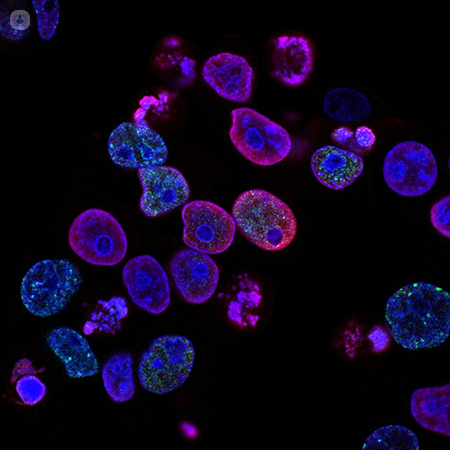An expert explains: How is radiotherapy used to treat bowel cancer?
Written by:Radiation therapy, also known as radiotherapy, involves using radiation to kill cancer cells and is used in the treatment in many types of cancer. In this informative article, highly respected consultant clinical oncologist Dr Nick MacLeod explains the applications of radiotherapy in the treatment of bowel cancer. The revered specialist also details how radiotherapy treatment is administered and the role of chemotherapy and surgery in combined approaches to the treatment of bowel cancer.

What is radiotherapy for bowel cancer?
Radiotherapy is a form of treatment which uses high-powered X-rays to target the cancer. When receiving treatment, patients lie on a couch while a machine called a linear accelerator moves around them and delivers the treatment. It’s quite like an X-ray or a CT scan and, although patients don’t feel the radiation during the treatment, it is having an effect on their cancer.
Radiotherapy treatment is quite commonly used, mainly with rectal cancer and often in the neoadjuvant setting (prior to consideration of any surgery). Our aim is to try and shrink the tumour down to make it more likely that surgery will be successful.
In a minority but a recognisable number of patients, radiotherapy, often in combination with chemotherapy, can sometimes eradicate the tumour completely. In such cases, patients may not need to go on to have an operation. This is an interesting development within rectal cancer and something that is causing quite a lot of interest in the oncology community in trying to reduce the need for surgery in all patients with rectal cancer.
Does bowel cancer have to be advanced to have radiotherapy?
Usually the cancer has to be locally advanced and radiotherapy is given with the aim of shrinking the tumour. Occasionally, radiotherapy can be given in earlier stages of disease if a patient is unable to undergo surgery, is not suitable for the operation or they really don’t want to have surgery.
Sometimes, radiotherapy can also be given if patients have cancer which has spread to other parts of the body and is causing specific symptoms. For instance, if the cancer has spread to the bone and is very painful, radiotherapy to that area can be very successful in helping to relieve pain.
How long does radiotherapy treatment for bowel cancer take?
The treatment itself doesn’t take very long and patients are usually on the couch for about ten minutes at a time. The duration of treatment is variable from patient to patient but tends to be either:
- five treatments in a row, with quite a high dose at each time; or
- once a day from Monday to Friday for five weeks, which is typically given in combination with chemotherapy
The five day and five week treatment approaches each have their pros and cons and the best form of treatment is decided on a case by case basis.
Do you have bowel cancer radiotherapy treatment before surgery?
Radiotherapy for rectal cancer is often given before surgery. An individual’s case is typically discussed at a multidisciplinary team meeting to decide on the best course of treatment. Usually, if the tumour is locally advanced and the surgeon feels they may not be able to remove it completely by going straight for surgery, radiotherapy is often given to try and shrink or downstage the tumour. This helps to make surgery more likely to be successful and increases the chance of the patient being cured of their cancer.
What are the side effects of radiotherapy for bowel cancer?
The side effects of radiotherapy are divided into what we call short term and long term side effects. Short term side effects are those which happen during or just after radiotherapy is performed, while long term side effects can happen potentially months or years down the line.
During treatment, radiotherapy can often make people tired and this usually a combination of both the treatment itself and the travelling back and forth to appointments. Also, the skin in the pelvic area can sometimes become inflamed and irritated which can feel like a localised sunburn. Although we target the tumour as best we can, some of the other normal structures within the pelvis (most commonly the bowel and bladder) will also receive a dose of radiation. This can cause bowel and bladder irritation and various different associated symptoms which come on either towards the end of radiotherapy or often shortly after treatment has finished.
On a positive note, within a few weeks of finishing radiotherapy treatment, we often hope to see an improvement in bowel symptoms as the tumour responds to the treatment and shrinks down. For instance, people often find that any bleeding or irregular bowel habits tend to settle with radiotherapy which is very encouraging.
In the longer term, (months and years following treatment), patients can get what we call late effects from radiotherapy. Often, it is difficult to ascertain whether the radiotherapy or surgery has caused these side effects and most commonly, it is in fact a combination of the two. There could also be bowel and bladder complications from radiotherapy which are always discussed further at clinic consultations prior to proceeding with the consent process with patients for treatment.
You can read more about the symptoms of bowel cancer in Dr MacLeod's other informative article on the condition.
If you require treatment for bowel cancer and wish to schedule a consultation with Dr MacLeod, you can do so by visiting his Top Doctors profile.



